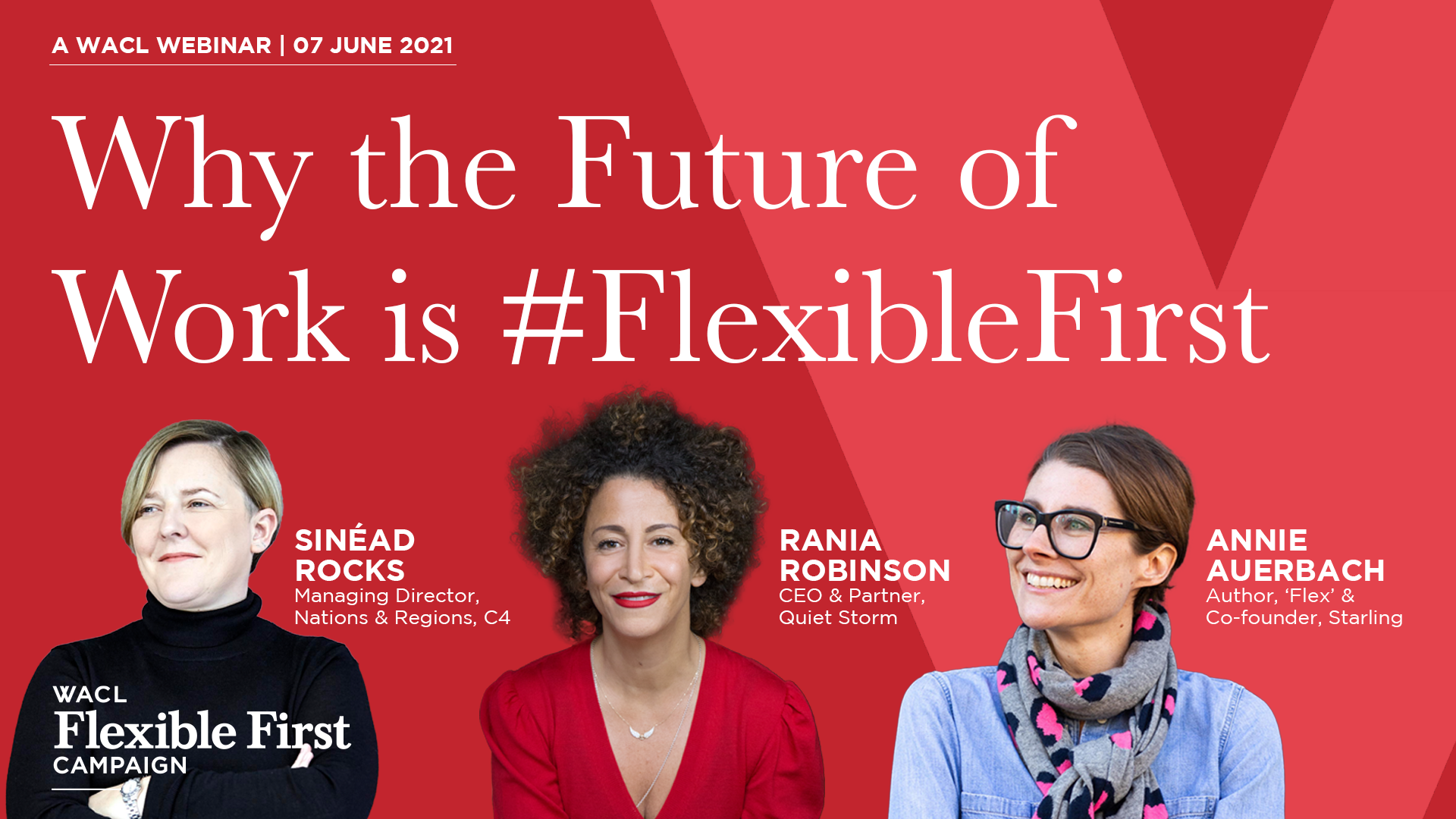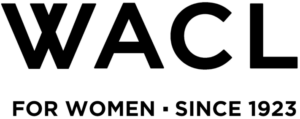
Why the Future of Work is #FlexibleFirst
WACL got together some of the industry’s most innovative thinkers on flexible working for a lively discussion about the future of work and the role flexible working can play.
Why the Future of Work is #FlexibleFirst kicked off with Annie Auerbach, the author of “Flex” and co-founder of Starling, looked at why society needs us to think big and be architects of a new way of living and working; Sinéad Rocks, Managing Director, Nations & Regions at Channel 4, considered how to create spaces that make the commute worthwhile and the importance of measuring outputs not hours; whilst WACL Vice President 2021/22, Rania Robinson, CEO & Partner at Quiet Storm, called for organisations to take difference and the needs of the individual into account alongside the whole, and also dug into how to maintain creative collaboration amongst hybrid teams.
A poll taken at the start of the event showed that just over half of participants felt confident their organisations have embraced #FlexibleFirst practices, but that still left half who feel that the approach was piecemeal or, worse, that there is still a stigma attached to working in their workplaces.
Adopt a test and learn approach to hybrid working
Mel Exon opened the webinar landing why WACL believes #FlexibleFirst working practices are essential as organisations plan for the future of work and the workplace. Moving on to discuss the hot topic of the day – hybrid working – she cited a recent Behavioural Insights Team trial as evidence for the fact companies are likely to fare better if they adopt a test-and-learn approach, rather than setting quotas on the number of days workers should spend working remotely. The BIT research showed that when a fixed number of days was stipulated (even when it’s representative of the average preference), this only satisfies a minority, and runs the risk of creating a gender gap, with women reducing their intention to work from home by 8%, whilst men’s intentions did not change.
Think big: this is a moment of ambition
Su-Mei Thompson (WACL Campaigning committee member) opened the interviews by asking Annie Auerbach why she had written her book, FLEX: Reinventing work for a smarter, happier life. Annie discussed her experience of “flexism”: the issue of flexible workers being perceived as less committed, leading to slower career progression on the one hand, and the need to be performatively busy at the times she had chosen not to work. Annie shared four major findings from the research she conducted for her book:
- ”Burnout and presenteeism (“burnt out bums on seats”) were issues long before the pandemic. The UK is near the bottom of the G7 league table in terms of productivity, despite having some of the longest working hours.
- Self-knowledge is important for helping us to optimise and to make sure that we work and live at our best. The rigidity of the 9-5 is not for everyone; we need to be able to capitalise on the moments when we are energised and performing at our best.
- Gender inequality. We are conditioning girls from an early age to take on the emotional load, resulting in the ‘motherhood penalty and the fatherhood boost’ in earnings potential.
- How can we pivot, retrain, and reskill to accommodate an ageing workforce. We need to think flexibly and sustainably about how to work past the age of 50.
Annie described a profound, once-in-a-generation chance to think intentionally about how we work and how we live. She discussed her frustration at people trying to nail down new models prematurely, and urged us to think differently and ambitiously about how we want society to be.
Measure performance on outputs, not hours
Sinéad Rocks shared her experiences with Channel 4 during lockdown. She shared how they are building back better with a 50-50 ‘manifesto, not a policy. This has been borne of staff engagement revealing people want to be together a part of the time, but not all of the time.
She explained that the biggest shift at Channel 4 is not about office vs remote working, but the flexibility about how and when you do your work. “Performance should be measured on output, not hours”. She added “there are times of day when someone may want to be bathing and reading to their baby. If that that means they log in later in the evening, that should ideally be their choice”, she said.
Sinéad added: “When people are coming into the office only part of the time, the challenge is how to make the commute feel worthwhile. How to provide sociability, camaraderie, and spontaneity, and how to help lighten the cognitive load you get when you’ve been on Zoom all day.”
“This is our reset moment […] I can make calculated assumptions, but I’d rather put the building together in a way that staff can work out what is best for them. The idea is to move away from the “call centre” fixed desks to look at collaborative spaces, private spaces, comfortable and relaxed spaces – anything to create a physical environment that excites people on the days when they come into work. We want to give them a chance to re-energise, to be with colleagues and to feel part of the organisation, because remote working can be isolating. I want all of us to be hyper productive at home and hyper productive in the office as well.”
One size does not fit all
Rania Robinson is also working on how to retain and optimise the flexibility that the agency developed during lockdown. Quiet Storm had always been informally pretty flexible, but is now keen to create company policy around a more conscious version of flexible working.
The experience of wholesale working from home created a sense of respect for each other’s schedules and personal situations, and there was positive feedback from staff around the ability to fit other things that mattered into their lives. But as time went on, the cracks started to show, certainly with newer, younger members of staff who needed more personal input – and while the work was good, the creatives just didn’t have as much fun making it.
Addressing the drawbacks of remote working
Everything became very task-led, which was great for productivity, but Rania came to realise that the softer things were getting lost, like camaraderie, collaboration and bonding. She reiterated they had also found the benefits of flexibility go beyond working from home – it’s about how you work, when, and how long you work.
Rania said: “None of us want to go back to the way it was, but change can make people feel uncomfortable. The radical shift we’ve been through has left us with an openness to doing things differently, so we are trying stuff out to see how it works.”
She also stressed that this is an exciting opportunity to build a truly inclusive environment. It is crucial to take into account people’s different backgrounds, levels of experience and comfort in the workplace. Likewise, the importance of allowing everyone a working life that supports their own personal values and wellbeing.
People need an environment that will take into account their differences. We need an approach to flexible working that works for everybody.
Provide freedom within a framework
The panel Q&A that followed began with a question from the audience. How should leaders provide the clear ground rules that people are looking for around hybrid working, without enforcing a one-size-fits-all situation? Sinéad shared how Channel 4 has hired consultants to work closely with staff teams to find the best practice for a hybrid workplace. This includes arranging schedules so that there is time to think at home, as well as the opportunity to meet up at work. For Annie, the answer is about adaptive leadership. She said: “Just because you are being flexible doesn’t mean you should bend over backwards. Flexibility needs hard edges, which we have to build as we go by testing and learning.”
Other topics that came up for discussion were:
- the need to unpick the gendered response to flexible working
- how to prioritise creativity and collaboration between members of a hybrid workforce.
Sinéad said: “It’s about investing in things that give you a reason to come to work, creating opportunities for people to come out of their silos and spend time with people elsewhere in the organisation. That’s when great things happen – otherwise you are just replicating systems and processes.”
On the question of what really happens when companies offer flexibility, Annie said that productivity during the pandemic had finally put to bed the “work from home / shirk from home” myth.
It’s now well known that flexible working is more likely to increase discretionary effort; it has a positive impact on retention and mental health, and it allows you to take care of yourself and the people around you.
A closing poll showed that 54% of the audience were already working flexibly and felt confident about the same. 39% felt more confident about flexible working than they had done at the start of the session.
Close: Why the Future of Work is #FlexibleFirst
Catherine Becker rounded off the event calling on organisations to check their progress with WACL’s free #FlexibleFirst Checklist. Backed by CMI, ISBA and Campaign, it includes four key steps to help organisation build back better:
- Collaborative technology
- Employee support systems
- Leadership training
- Agreed metrics
